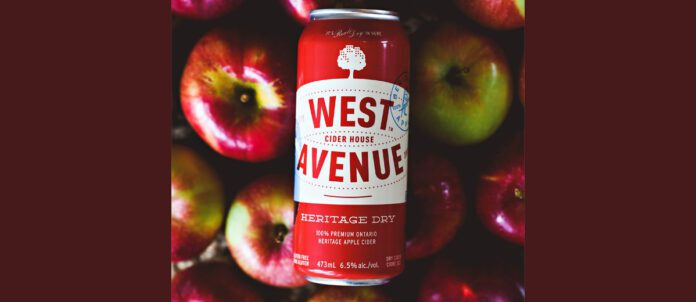In 2012, Chris Haworth and his wife Amy Robson were at a crossroad in their respective careers.
Given Haworth was an executive chef, the obvious choice was opening a restaurant. “But we wanted to spin it around and do something where we didn’t have to work until midnight or on holidays,” says Robson.
So, instead, they took the road less travelled to start their own venture: West Avenue Cider House.
From humble beginnings in a leased warehouse and supplying a handful of foodservice customers, their all-natural quality and award-winning hard ciders are now distributed to more than 300 independent restaurants and bars in Ontario. The company home is now a 75-acre property in Carlisle called Sommerset Orchards, where they grow more than 100 varieties of heritage apples and 10 varieties of pears.
The interest in cider came naturally for the British-born Haworth. “There is so much amazing cider there,” says Robson. “When we came to Canada, no one was doing that except for some sweet ciders coming out of B.C.”
Haworth, who always had an interest in brewing and winemaking, went to work developing cider recipes. At first, they ran a remote model, living in Toronto, sourcing apples, and renting space in another cidery for production. Their first product, Heritage Dry, sold out in the first year and remains their biggest seller to this day. Other best-sellers include Cherriosity and one of their latest creations, Little Mac.
With a successful launch, and demand exceeding supply, they decided to purchase the farm in 2015. They planted 6,000 apple trees, renovated the property, and set up a tasting room.
“The dream was always to have a place to call our own, to plant apples, and welcome people to try our products,” says Robson. They have since added a rental cottage, farm bakery and store.
All the apples grown on the property are heritage, she explains. “We grow true cider fruit – not the more familiar apples for eating like Golden Delicious or Honeycrisp. We’re after apples that are bitter and tannic.”
She estimates the company averages 25 different releases a year. “Our offerings are constantly evolving. We always have six draft lines and six different bottles to try here at any given time.”
Since they started operations, the competitive market for cider has exploded, says Robson. “When we started, there were 15 cideries in Ontario. Now there are 150. It’s much more competitive, but the quality of our cider is really high because we grow a lot of our own fruit and the flavour really stands out. While a lot of those competitors are virtual like we were when we started, we can do it all, from orchard to glass.”
The biggest competition these days is the RTD (ready-to-drink) category, she notes. “For four years RTDs have been taking the bite out of beer and cider. Beer has taken a bigger hit, while cider seems to have plateaued.”
West Avenue Cider’s continued strength in the market lies in the quality of the fruit and a slow, natural six-month fermentation process. “Anything less than that would not be fermented naturally,” she says.
Winning numerous awards over the years has helped them keep pace with the growing field of competitors. Accolades include multiple wins in the Great Lakes and International Cider and Perry Competition (GLINTCAP), and the Canadian Cider Awards. Its Northern Lights ice cider also won a double gold at the All-Canadian Wine Championships, an award that Robson says, “brings you to different level”.
Another milestone of note was getting their products into the LCBO in 2020.
Robson is especially proud of the fact they have received a 2023 Regional Tourism Hamilton-Halton-Brand Responsible Tourism Award, a nod to their long-standing commitment to sustainable practices.
“Our orchard is organic. We have 500,000 honeybees that come and pollinate everything on the farm, and the sheep can go and fertilize the orchard. That’s the type of sustainable type of agriculture we practice. Everything we touch, from the meat and cheeses to the eggs and maple syrups we sell on the property, is from Ontario.”
The focus this year and next is to expand the offerings on the property. “We’re trying make the farm a destination place for Ontario,” says Robson. “We’ve added a permanent campfire and are in the process of installing an outdoor wood oven for outdoor cooking so guests can come and make a day of it.”
While they hope to expand in Canada, they are taking their time working out the logistics. “Distribution to Canada and beyond is not easy,” says Robson. “We have to think about what’s involved before we expand further.”
As a small supplier, it doesn’t compete with the big brands that you find in chains, she adds. “We’re much more aligned with smaller partners that really focus on the quality of their products – just like us.”
By Denise Deveau

















